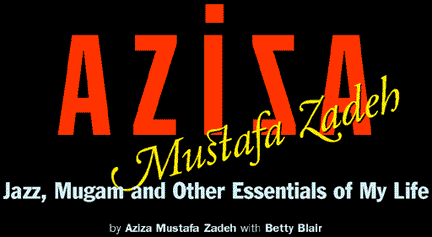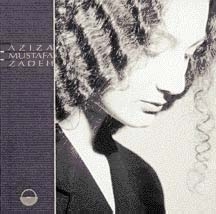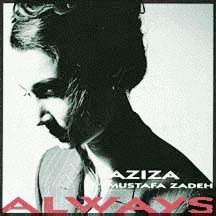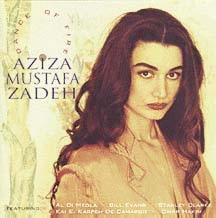|
Music samples Just a few days before going to press, we finally caught up with her in Germany as she was in the process of rehearsals for her fifth CD. "Her place would have been missing" as the Azeris say, had we not been able to feature her in this issue which is dedicated to "Youth." Probably no other young person outside the country is more widely known. Here she shares some of her reflections on life, music and her family.
In 1978, my dad represented the Soviet Union at the World Jazz Festival in Monaco and took first prize. Dizzy Gillespie, a famous black jazz trumpeter who had himself contributed so much to the modern jazz movement, used to say, "Vagif's music is from another planet! It's the music of the future!" And my mother, known as Eliza Khanom, is incredibly talented in music, too. She was one of the first to sing in the new mugam jazz style. How fortunate to have been born into such a family. First Musical Awareness My mother is fond of telling the story of how she discovered my sensitivity to music. I was eight-months-old at the time, just a baby really. Once, my father was improvising at the piano playing in the mugam mode known as "Shur," which creates a mood that evokes very deep, sad emotions. As my father was playing, I started to cry. Everyone wondered what was happening to me. Why was I crying? And then mother realized the correlation between my feelings and the music. "Vagif, please," she told my father, "change the scale. Go to 'Rast.' Play 'Rast.'" And he did. Now 'Rast' is characterized by its joyfulness and optimism. And sure enough, with tears still running down my cheeks, I started to make dance-like movements. And Mom pointed out, "Look, look what she's doing! Change back to 'Shur!'" And when he did, I started crying again louder than before. At least, that's what they tell me. Back to "Rast," and I began dancing again. You know, I'm the same today. Maybe the way I express myself has changed, but my soul remains the same-always extraordinarily sensitive to music. My father used to call me "Jazziza." My Father's Death
Actually, I don't really believe
in death. I think it's only a biological phenomenon, not spiritual.
For me, my father has never died. He simply has left this earth.
People are often curious about the circumstances surrounding my father's passing. Curiously, just before he died, a big mirror in the bathroom fell off the wall and broke. Some people might laugh, but that was the day he left for a concert in Tashkent (Uzbekistan). And I started to cry. I cried so hard and I begged him, "Don't go on this trip." Of course, I couldn't understand exactly what was going to happen to him. But I begged him not to go. The last time I spoke with him on the telephone was December 15, and I pleaded, "When will you come? I want to see you tomorrow." He told me, "No, it's not possible because I have a concert. But, my darling, don't worry. I'll be back, and we'll be together for Momma's birthday." But it never happened. It seems he hadn't been feeling well, and doctors cautioned him not to play. But he insisted, "No, I must play." And he gave a superb concert, although not many people filled the great hall. It was a special Muslim religious day there-the day of Ashura Hussein when men march in the streets and beat themselves in commemoration of the death of Hussein, the third Shiite Imam. After my father finished the concert, he had a severe heart attack and died. He was only 39. Why was his concert scheduled on that day? Because of the stupid Soviet system. They were always doing things completely wrong. I can't understand this old system. It broke the lives and hearts and careers of so many people. In the end, my father died because of so much stress. It really wasn't fair to him. They had organized a concert for him on a day when they knew very few people would come. They wanted to shame him. Music is not traditionally performed on that day. My father used to receive so many invitations from abroad inviting him to participate in different international festivals in America, in Europe-everywhere. Once he was invited to Finland to participate in a jazz festival, but a few minutes before the plane was to take off, someone called, "Mr. Zadeh, Vagif Zadeh, please return. Someone is waiting for you." And he went to see what was happening, and they wouldn't allow him back on the plane. It was a ploy to keep him from going abroad. It was simply because he was a jazz player. There were many situations like that. Thoughts on Jazz
After father's death, my mom stopped her career and directed all her attention and energy to me. I'm so thankful for her. You can't imagine how much she's done for me. I trust her musicianship. She has an incredible sense of rhythm and endless creativity. She helps me with my compositions. It's the continuation of a tradition that started with my father. He used to compose new jazz pieces, and he would call her, "Eliza, please come. You're my best critic. Listen to this. What do you think? Which version is better-this one or that one?" Every musician should have such a person that he or she can trust both creatively and personally. Thank God, I have my mother. I've produced four CDs, and I'm busy recording a fifth. I have some other compositions as well. I haven't written them all down, but I remember them well and perform them at concerts. To tell you the truth, I don't have the patience to write them all down. It takes a long time and it's very difficult. When I perform, I improvise a lot. My compositions are really quite different from classical jazz. What am I trying to do in my music? Well, I think of my performances as musical meditations. I want my music to inspire people to live their lives without fighting, without war, without jealousy and without hating each other. Those are the saddest aspects of human experience. Life is quite short. It can be so beautiful, so why should we destroy ourselves with such primitive acts. I don't understand it. I don't understand how such things happen. I see no reason for it. My father used to say that the world would be saved by music. When I perform and play my jazz compositions, I often accompany myself with what is known as scat singing. It's just another extension of my intensity when I play. It's characteristic of me. I really don't know of any Azeri tradition that uses it. My own background is classical music, and I'd have to admit that it has turned out to be extremely valuable, providing an excellent foundation for intellectual growth. That's the brain part. But then, a person like me needs to give spontaneous expression to the inner self and soul, to the heart. Early Years
No one has to do anything, you know. I love freedom. Of course, I'm more responsible now than I was 10 years ago. But I've always sought freedom. I love spontaneity. Some people expect me to practice a lot and are rather surprised when I tell them I don't understand what "practice" means. Instead, I understand inspiration. I don't think you should touch the piano when you don't have the right inspiration or else you'll play badly, and that's a sin. I don't like committing sins. Indeed, we're all sinners. But we should try to sin as little as possible. When you do something, you should do it because you love to and want to. We must inject love into everything we do. At least, we must try. That's my opinion. You have to enjoy what you're doing. Performing These days, I'm performing in various countries and I love it. Where will I be in 1997? I really don't know. To tell you the truth, I never remember where I have to be. Everything is organized and then I just go. Sometimes, I don't even remember all the cities I've performed in. For me, the stage is my motherland, so I feel very much at home wherever I perform. I don't get nervous in front of all those people. I love large crowds. I'm very comfortable when I get to perform in front of several thousand people. It's true each performance is different. There are so many factors that contribute to how each performance evolves. Everything can affect performance. The audience's response. Even the weather. But in the end, performance depends upon God. Mugam is the main musical inspiration in my jazz compositions. How can I describe mugam? Well, mugam is magical music. I don't use it in its typical traditional form. I mix it with other forms, like classical or avant-garde music. Mugam has a great ability to charm and mesmerize, almost hypnotize. It's so deep. I've noticed that it doesn't matter where I perform it, people always identify very deeply with it in every country. Mugam is very, very profound. It's very powerful, and it's ancient. It is hundreds, possibly even thousands, of years old. My audiences understand mugam-believe me, they really understand it. They feel it. Maybe they can't define it or analyze it theoretically, but that's not so important. But they can feel it. And I sense that they feel me. They understand quite deeply what's going on inside me. I'm happy for that. What could be better? Every musician strives for this experience. The Controversial Cover
But I'm delighted to hear that it stirred up such a controversy. I love hearing that. That's good! It means people are starting to wake up a bit. I'm so glad. Actually, I find it amusing! Why all the fuss? Maybe some women are jealous, or maybe they're too fat to appear like that themselves. Or maybe they're deaf and can't really comprehend what's going on in the music. I made that cover because I feel it best reflects my music which really is very open to sensuality. The cover should be exactly the way it is, because it's me. It's exactly me. I'm very open. People who are more intellectual, I'm sure, would understand more what I was trying to do. Prizes In 1994, I won the Phono Academy Prize, Germany's most prestigious award in music. That year I also won the Echo Prize from Sony, a company prize for my second CD, "Always." But if you want more information about prizes and performances, you'll have to ask my agent. I don't think about them very much. To me, my greatest satisfaction is when God gives me new ideas to compose new compositions. I see progress in my music. I sense it in the music I've recorded. I'm developing. Getting better. My aspiration is to be able to achieve what my parents have. That's my dream! LeisureWhat do I do in my leisure? I like to paint when I have time-especially in oils. It's my favorite pastime. My canvases look like my music sounds. They're very difficult to describe. They're truly improvised-like a blend of jazz, mugam, avant-garde and classical all mixed together. Or, maybe, they're a bit like my performances-a synthesis of both piano and voice. I love colors-violet, blue, yellow, green, red. These are the colors that I feel are integral to my music. What else do I like to do in my leisure? I love to sleep. Maybe it's because I usually sleep so poorly and so little. I wish it were possible to sleep on a cloud. That's what I wish I could do-sleep on a cloud! Azerbaijan's FutureI try to get back to Baku as much as possible in spite of my busy schedule. Unfortunately, it's not often enough. This year, my mother and I went back in March for a concert in memory of my father. It was at the Opera Theater. The hall was completely full. As we say, "There was no place, not even to drop a needle." It was packed and it was so, so, so marvelous! I think Azerbaijan has a great future because Azerbaijanis deserve it. Don't you think that Azerbaijanis deserve to be happy? I truly believe that the future will be bright for Azerbaijan. I have a highly developed sense of intuition that makes me feel that way. And I have dreams. And most of my dreams come true. For example, there have been times when I sensed dangerous situations beforehand, and I've called and warned people about them. "Please don't go out, or don't drive your car on Thursday at 6:30 p.m." I intuit these kinds of situations. This is a gift from my great-grandfather on my father's side. For me, he was a saint. It's another gift that God has given me. I'm blessed with this gift, but sometimes it makes me very heavy. Whenever I come in contact with anyone, I can sense the truth about them. I can read people like a book. Sometimes, I see people smiling and speaking very warmly to me, but then when I see their auras, I realize they are completely different. I say to myself, "My God, how pitiful these people are and how dishonestly they have presented themselves," since appearance totally contradicted reality. But the truth is, a person is most powerful when both the inner feelings and outward feelings are aligned with each other and when there is no need to disguise or camouflage one's true feelings. Azerbaijan deserves to be happy because the Azeri people don't wear masks on their souls. Their souls are clear-like a baby's. Azerbaijani people are really sincere. Not everybody, of course. But most of them are very open and kind-hearted. Even when they're poor, they're willing to offer you all that they have. Sometimes, they go to a neighbor's and borrow money equivalent to several weeks' salary just to be able to invite you as a guest into their home. "Eat with me. Drink with me. Enjoy dinner with me. Share what I have." That's what so many Azerbaijanis are like. They're genuine. I'm very sure that Azerbaijan's future will be very bright. Perhaps, the fact that we have such deep, traditionally rich music such as mugam makes it impossible for us to imagine that our country could remain on this same level as it is today. I'm confident that it will improve. It will just take time. My friends tell me that things are gradually getting better in Azerbaijan. Very slowly. But maybe the fact that it goes so slowly will enable us to build a stronger foundation for our independence and freedom. Perhaps, if we developed too fast, it might be very easy for us to stumble and fall. Our steps are clumsy and heavy now, but, nevertheless, I believe that we're moving forward. I'm not the president of the world. Otherwise, my first law would be that we must all be vegetarians and not eat any creature. We have to cherish nature. We must be very tender with all trees, animals, lakes, seas, rivers and all the life around us. And we must not be jealous. We must love our parents and all the members of our family. We must respect our neighbors and colleagues, and most importantly, we must build our happiness by ourselves. It's so easy to understand. Maybe, I'm not realistic. Maybe my perception is not right. But that's the way I see it. This interview took place in English between Aziza Mustafa Zadeh in Mainz, Germany, and Betty Blair, Editor of Azerbaijan International, in Los Angeles, on December 6, 1996. Footnotes 1 Mugham (pronounced moo-GAM). In Azerbaijan, mugham has two meanings. The first, which conveys the meaning in this article, refers to a modal system of music, of which there are possibly more than 70 types, which define the pattern of intervals, range, and direction of melodic movement and rhythm. Mugham also refers to a trio which performs this kind of music, led by a singer and accompanied by musicians typically playing "tar" and "kamanche." 2 Prior to Vagif Mustafa Zadeh synthesizing mugham and jazz, mugham had already been incorporated into opera in the works of Azerbaijani composer Uzeyir Hajibeyov in the early 1910s. Mugham was introduced into Western symphonic music for the first time by Azerbaijani composer Fikrat Amirov in the mid-1940s. 3 Her CDs include "Aziza Mustafa Zadeh"(Columbia 468286 2, 1991); "Always" ((Columbia 473885 2, 1993); "Dance of Fire" (Columbia 480352 2, 1995) and "Seventh Truth" (Columbia 484238 2, 1996). 4 Scat: Aziza often accompanies her own jazz playing by singing "scat" or meaningless syllables instead of words which create a special instrumental effect. From Azerbaijan International
(4.4)
Winter 1996. Back
to Index AI 4.4 (Winter 1996) |






